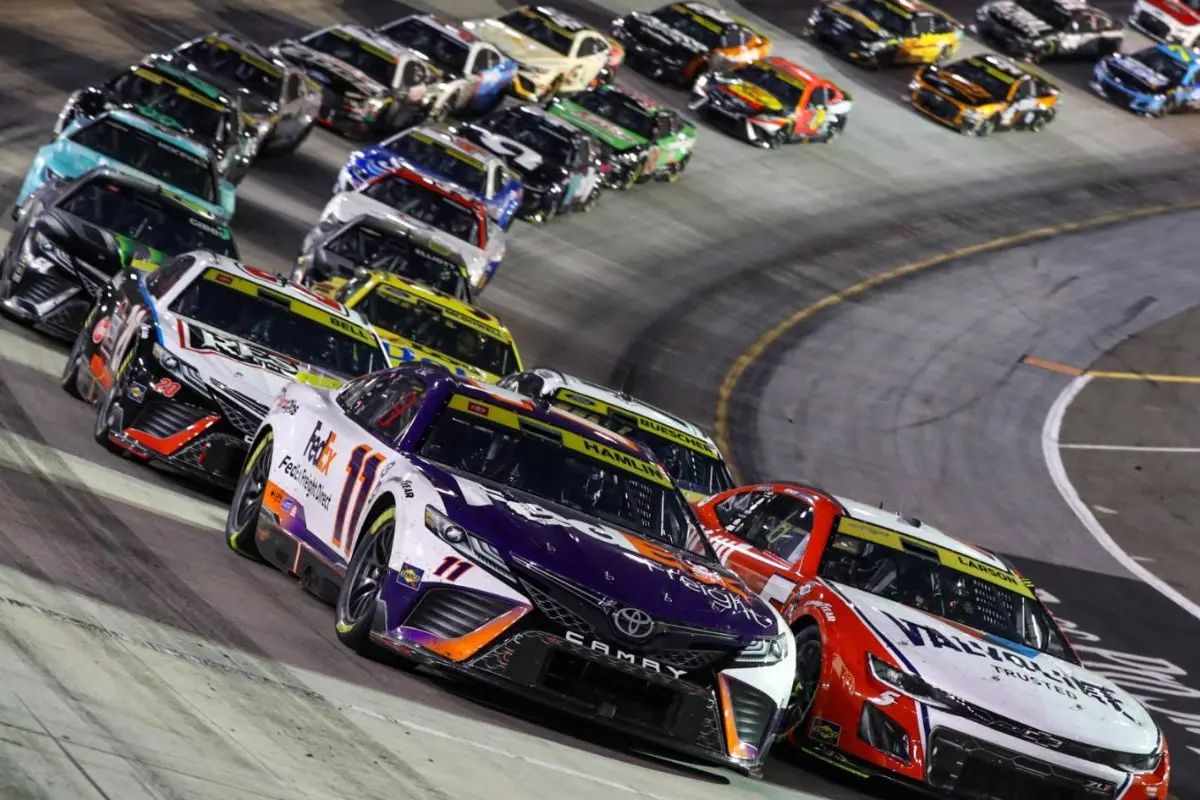The lost NASCAR legacies of 2003 marked a watershed moment in the sport, highlighted by the loss of legendary figures and the shattering of longstanding records. The retirement of Bill Elliott and the departure of Pontiac after decades notably altered the sport’s emotional fabric and competitive dynamics. Matt Kenseth‘s championship win, despite only one victory, ignited debates over the effectiveness of the new points system, which many fans preferred to the traditional format. Coupled with memorable moments like Ricky Craven’s dramatic win, the season encapsulated a shift in racing culture.
Key Highlights
- The 2003 season ended the full-points format, leading to controversy over Matt Kenseth winning the championship with only one victory.
- Pontiac’s departure after nearly 50 years left a significant void in NASCAR, impacting competitive dynamics and fan nostalgia.
- Bill Elliott’s retirement marked the loss of a legendary driver, affecting fan loyalty and the emotional landscape of the sport.
- Fans expressed a desire to revert to the traditional points system, which incentivized consistency and overall performance throughout the season.
- The season was characterized by record-breaking performances and notable controversies that shaped the future of NASCAR’s competition formats.
Joey Logano’s Historic Championship and Modern NASCAR Statistics
How has Joey Logano’s unexpected championship reshaped our understanding of success in NASCAR? Logano’s triumph in the 2024 Cup Series marked a paradigm shift in how success is evaluated within the sport. Entering the postseason ranked a modest 15th in points, Logano’s ascent to the championship was characterized by an unorthodox path, culminating in a final standing of 11th. His achievement, highlighted by the fewest top-ten finishes—only 13—and the lowest average finish at 17.1, challenges traditional metrics that have long governed perceptions of competitive excellence in NASCAR.
Historically, championships have been awarded to drivers demonstrating consistent high performance throughout the season. Logano’s victory redefines this narrative; it suggests that tactical adaptability, resilience, and peak performance at critical moments can outweigh sheer statistical dominance. This shift highlights a fundamental transformation in the NASCAR landscape, driven by evolving competition formats and the increasing significance of playoff dynamics.
The implications of Logano’s championship extend beyond individual honors; they resonate throughout the sport, prompting stakeholders to reassess how success is quantified and achieved. The juxtaposition of Logano’s performance against the backdrop of the 2003 season depicts the dramatic evolution of NASCAR’s competitive framework.
The Loss of Legacies in NASCAR During 2003
In 2003, a remarkable chapter in NASCAR’s storied history closed, leaving fans and stakeholders to grapple with the loss of enduring legacies. This season marked a poignant change in the competitive landscape of stock car racing, demonstrated by the scrapping of the full-points season format. Matt Kenseth’s championship, achieved with a mere single victory, highlighted a growing discontent with the sport’s structure, ultimately leading to the introduction of ‘The Chase’ format in 2004. Kenseth’s passive finale at Homestead Speedway, where he finished last, represented a season that prioritized consistency over exciting competition.
Moreover, the departure of RJ Reynolds and its 33-year sponsorship of the Cup Series not only represented an end of an era but also greatly altered the dynamics of team qualifications for the championship. The shift to Nextel as the new entitlement sponsor marked a vital turning point, setting the stage for a corporate-driven evolution of the sport.
The emotional weight of 2003 was further compounded by the retirement of Bill Elliott, a 16-time Most Popular Driver and 1988 series champion. His exit left a tangible void, resonating deeply with fans who cherished his contributions to the sport.
Collectively, these changes not only indicated the end of revered legacies but also heralded a new era that would reshape NASCAR’s identity, reflecting a tug-of-war between tradition and modernity that continues to define the sport today.
November 16, 2003: A very transformative day for NASCAR
-Winston's last race after 33 years
-76's last race
-The last of the full-season points
-Pontiac left
-Bill Elliott's last race as a full-time driver
-Bobby Labonte's last win
-First race for the new Homestead layout pic.twitter.com/C6EXjib7UZ— nascarman (@nascarman_rr) November 16, 2024
Pontiac’s Departure from NASCAR and Its Impact
Marking the end of an era, Pontiac’s departure from NASCAR in 2003 signified not only the loss of a prominent manufacturer but also a shift in the sport’s competitive fabric. With a storied history that spanned nearly five decades, Pontiac had etched its mark on the sport, achieving 154 victories from 1957 to 2003. The legacy of iconic models such as the GTO, Firebird, and Grand Prix highlighted the manufacturer’s commitment to performance and innovation, nurturing a deep connection with fans and drivers alike.
Pontiac’s exit coincided with a tumultuous period in NASCAR, characterized by notable changes in vehicle specifications and sponsor dynamics. The departure of such a storied nameplate altered competitive parity, as teams were forced to adapt to a new landscape dominated by other manufacturers. This shift not only impacted the teams that had relied on Pontiac for engineering skill but also affected fan engagement, as supporters mourned the loss of a brand synonymous with legendary drivers like Richard Petty and Rusty Wallace.
The emotional resonance of 2003 was amplified by Pontiac’s farewell, as the manufacturer’s final season yielded memorable moments that would linger in the minds of fans. Each race became a tribute to a name that had defined an era, further deepening the void left in the wake of its departure.
Pontiac’s Legacy of Speed in NASCAR
Pontiac’s legacy in NASCAR is defined by an impressive combination of raw speed and engineering skill that captivated fans and competitors alike. The brand’s performance in the 1960 Daytona 500 exemplified this legacy. Junior Johnson, a formidable driver of the era, recounted how Pontiacs dominated the field, rendering the competition nearly futile. Despite his eventual victory, it was clear that the speed of the Pontiacs set a benchmark that few could achieve.
“Those damn Pontiacs were so fast it was hardly worth trying to run against them.” – Junior Johnson
Fast forward to 1984, when Richard Petty clinched his 200th Cup victory in a Pontiac, solidifying the brand’s status as a titan in the NASCAR landscape. The charm of Pontiac’s performance endured into the 2000s, marked by Ricky Craven‘s dramatic win at the 2003 Carolina Dodge Dealers 400. The race showcased not only the cars’ speed but also the resilience of drivers like Craven, who triumphed despite personal challenges. His victory, coming down to a mere .002 moments over Kurt Busch, highlighted the exciting nature of racing and the competitive spirit embodied by Pontiac.
“It is hard to think that our win that day will be the last ever for Pontiac, There are brand names in America that you just assume will always be around. I hoped one day it would make it back to the racetrack. Shouldn’t we be making a bigger deal out of this?” – Ricky Craven
As Pontiac exited the NASCAR scene, the void left behind was noticeable. Craven’s poignant reflection on the brand’s legacy speaks to a broader sentiment within the racing community. Pontiac represented not just speed but also a rich history interwoven with triumphs that echoed through the ages.
The brand’s departure marked the end of an era, leaving fans and drivers alike yearning for the return of a legacy steeped in unparalleled performance and passion.
NASCAR Fans’ Desire for the Old Points Format
A considerable number of NASCAR fans have expressed an intense desire to revert to the old points format that governed the series prior to 2003. This longing stems from a perception that the previous system nurtured a more competitive and equitable environment, where consistency and performance across the entire season were paramount. The traditional points structure awarded drivers points based on their finishing positions, thereby incentivizing not just victories but also a consistent presence in the top ranks.
In contrast, the contemporary format, introduced during the sweeping changes of 2003, has been criticized for its focus on playoff-like scenarios, which some fans believe diminishes the significance of regular-season performance. The current system’s emphasis on winning races to secure bonus points can lead to an unpredictable championship outcome, which, while exciting, often leaves fans longing for the predictability and stability of the previous format.
The nostalgia surrounding the old points system highlights a deeper yearning for the integrity and historical continuity that characterized the sport.
Despite NASCAR’s apparent reluctance to revert to the old system, there are indications that minor adjustments could be on the horizon, as the governing body continues to gauge fan sentiment. The call for change reflects a broader conversation about the nature of competition in NASCAR.
News in Brief: The Lost NASCAR Legacies of 2003
The 2003 NASCAR season marked a pivotal moment characterized by notable losses and transformative changes within the sport. The departure of Pontiac highlighted a shift in manufacturer representation, while the events of the year profoundly impacted driver legacies.
Furthermore, the evolution of racing statistics, exemplified by Joey Logano’s historic championship, reflects the dynamic nature of the sport. Ultimately, the yearning for the old points format reveals deep-seated connections between fans and the sport’s storied history, emphasizing the ongoing tension between tradition and modernity.
ALSO READ: Joey Logano’s Las Vegas Moment That Flipped His 2024 Season



